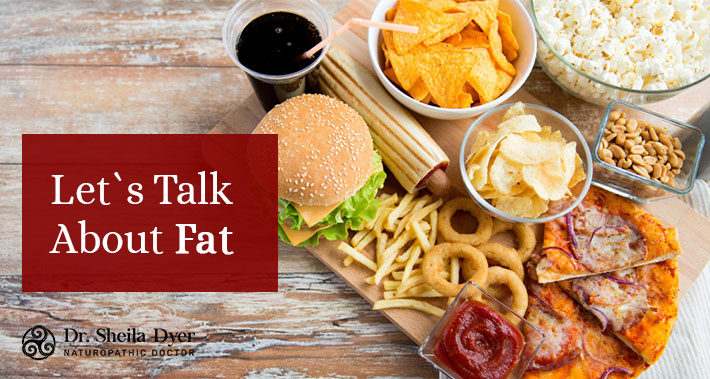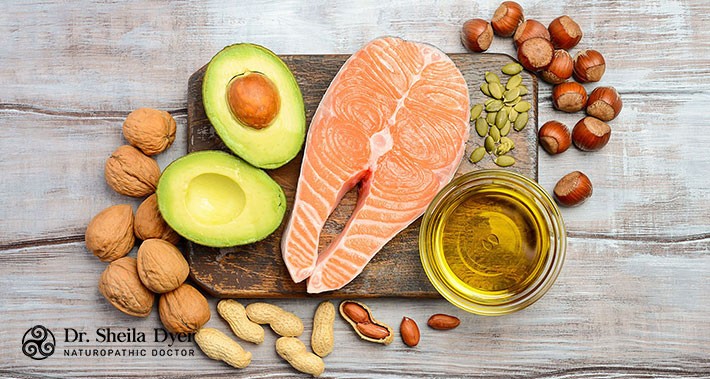Fats have had a lot of contradictory recommendations over the decades, including by the medical and scientific communities.
However, as observations, studies, and clinical research continue to uncover new information, it’s important to stay abreast of new recommendations.
Today, we know that fat is one of many necessary elements of a healthy diet.
However, not all fats are created equal; some are better for you than others.
Let’s talk about fat.
What Is Fat?
Your body needs fat – fat is an important macronutrient that provides energy, protects your skeleton and nerves, helps you absorb certain vitamins and minerals, and helps build cell membranes.
Different fats will also help your body in different ways, which is why it’s good to get different types of fat in your diet.
Let’s quickly review some terminology before we get into looking at the different types of fats.
“Oil” describes any fat that is liquid at room temperature.
However, “fats” or “fatty acids” describe fats that are usually solid at room temperature.
“Lipids” can be either liquid or solid.
“Animal fats” refer to not just the fats in meat, but also lard, butter, and other dairy such as cream.
“Vegetable fats” refer to fats derived from plants, such as olives, flaxseed, corn, peanuts, soybeans, and avocados.
All these fats contain the exact same number of calories: nine per gram.
However, different types of fat can have different benefits and drawbacks, so read on to learn more.
Does Eating Fat Make You Fat?
Just because you’re eating fat doesn’t mean you will become fat, though that used to be the old assumption.
If you’re gaining weight, there are many other culprits to look at than just your fat intake.
Different types of fat will affect your health in different ways, especially when it comes to blood and heart health.
Let’s have a look at the three main fats.
1. Saturated Fats
Saturated fats are so called because their basic carbon structure is saturated with hydrogen atoms.
They are solid at room temperature, and come from sources such as dairy products (unless they’re fat-free), meat and meat products, processed foods (such as baked goods and French fries), and also some vegetable oils.
If you’re looking to add more fat into your diet – perhaps for energy – you’re far better replacing saturated fats with whole foods like avocados, nuts, seeds, vegetables, and beans.
The reason is that eating too much saturated fat over time can eventually take its toll.
Eventually, more than the daily 13g recommended limit could lead to ‘bad’ LDL cholesterol building up, increasing the risk of stroke and heart disease.
2. Unsaturated Fats
Unsaturated fats are considered by healthcare professionals to be the ‘good’ fats, and these are the ones I recommend patients focus on including in their diet.
Unsaturated fats are liquid at room temperature.
There are two basic types of unsaturated fat: monounsaturated and polyunsaturated.
Their name reflects that at the molecular level, they only have one hydrogen atom bonded with them.
These help keep up levels of ‘good’ HDL cholesterol, and they are prevalent in the Mediterranean diet.
You get monounsaturated fats from olive oil, nut butters, avocados, and also nuts and whole olives.
Polyunsaturated fats, by comparison, have more than one hydrogen atoms attached to the fat molecule, though it is not considered ‘saturated’ with them.
We have enough research to know that these are good for our health; you may have heard of omega-3 fatty acids, which are polyunsaturated fats.
Omega-3s can reduce inflammation, keep your cardiovascular system healthy, and improve brain, blood, eye and joint health.
Another type of polyunsaturated fat is omega-6 fatty acid.
With omega-6s, you will need to monitor your intake – an excessive reliance on these fatty acids can lead to added inflammation.
Find your healthy polyunsaturated fats in the following foods:
- Grapeseed, safflower, soybean and sunflower oil.
- Fish such as salmon, trout, sardines, mackerel.
- Nuts and seeds, plus some eggs.
3. Trans Fats
Trans fats are the fats you want to stay away from at all costs.
In fact, that should be fairly easy, considering both Canada and the US has banned the use of trans fats.
Eating foods that are heavy in trans fat increase the amount of harmful LDL cholesterol and reduce the beneficial HDL cholesterol in your bloodstream.
They produce inflammation that leads to diabetes, stroke, and especially heart disease.
For instance, if you were to take in even two percent of your calories from trans fat, your risk of heart disease increases by 23%.
Trans fats are a byproduct of the process that turns healthy oil fats into solids in order to prevent them from spoiling.
Book An Appointment With Dr. Sheila Dyer, ND
As you see, there’s no need to avoid fat – in fact, I encourage you to add the right fats into your diet at the right time of day.
If you’re looking to overhaul your eating and want some guidance so that you see the very best results, book an appointment with me and I can guide you through.
With our busy lives and daily stress, eating healthily can be challenging, but know that you have help to find your path.
If you have questions about naturopathic medicine, or would like to start with your first consultation, contact me, and let’s book an appointment.
Dr. Sheila Dyer, ND1080 Dovercourt Rd,
Toronto, ON M6H 2X8
(416) 554-5135
► https://g.page/DrSheilaDyerNd
Dr. Sheila Dyer is a Naturopathic Doctor and a practicing registered nurse offering holistic healthcare with a scientific focus

